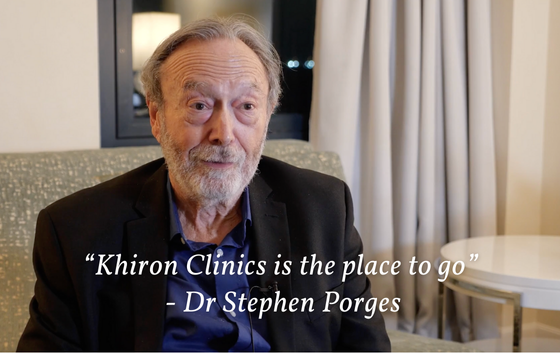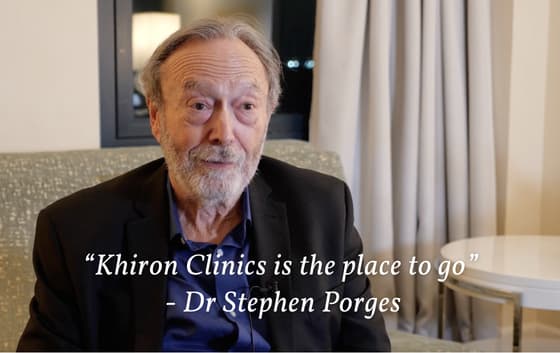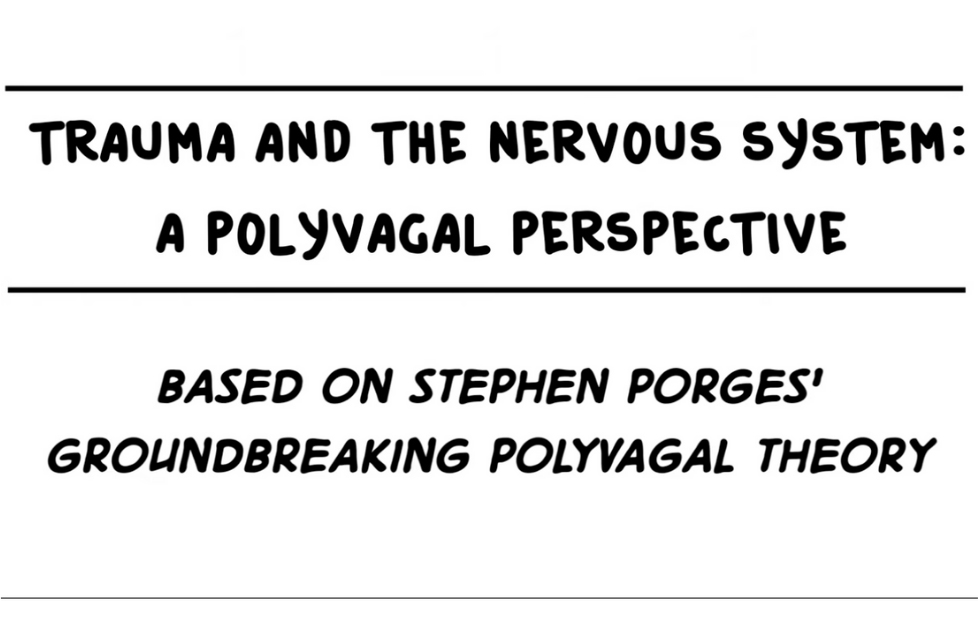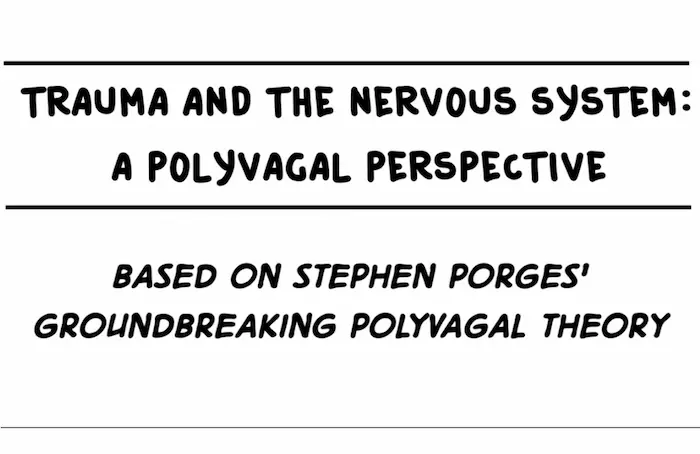What is Polyvagal Theory? Understanding Trauma and Healing
Khiron Clinics; The First Polyvagal Informed Certified Residential Clinic in the World
At Khiron Clinics, we are proud to be the world’s first Polyvagal-informed certified residential clinic, recognised by the Polyvagal Institute. Polyvagal Theory, developed by Dr. Stephen Porges, offers a revolutionary way to understand how our nervous system shapes emotional responses, behaviour, and overall well-being. It shows how the body’s physical state directly affects our ability to feel safe, connect with others, and respond to stress. This understanding is especially vital in trauma care, where dysregulated nervous systems often underlie persistent symptoms of anxiety, depression, or PTSD.
This page is for anyone exploring trauma treatment options, clinicians seeking a reference for Polyvagal-informed approaches, or families supporting loved ones navigating the complexities of trauma. If you’re struggling with trauma or seeking new approaches to recovery, Polyvagal-informed care may provide the missing piece.
At Khiron Clinics, our certification in Polyvagal Theory shapes everything we do. From our therapeutic interventions to our residential environment, we prioritise safety, regulation, and nervous system integration, helping clients move from survival to thriving.
“If you want to improve the world, start by making people feel safer.”
Dr Stephen Porges
What is Polyvagal Theory?
Polyvagal Theory, developed by Dr. Stephen Porges, explores how the mammalian autonomic nervous system and its neural circuits respond to stress, threat, and trauma. Central to the theory is the vagus nerve, particularly the ventral vagal pathways originating in the brainstem, which play a crucial role in regulating both emotional and physiological states. These pathways allow the body to shift between states of safety and social engagement or defensive reactions such as fight, flight, or freeze.


“If our nervous system detects safety, then it’s no longer defensive. When it’s no longer defensive, then the circuits of the autonomic nervous system support health, growth, and restoration.”
Dr stephen porges
The theory emphasises that when the nervous system perceives threat, it automatically moves into protective states, which can be helpful in the short term but become problematic when trauma or chronic stress keeps the body locked in dysregulation. Over time, this can affect heart rate, digestion, hormone balance, immune function, and emotional resilience.
Polyvagal Theory also highlights the interconnectedness of body and mind, showing that emotional and cognitive experiences are inseparable from physiological states. For trauma survivors, this explains why the body often holds onto stress even when the original threat is no longer present.
At Khiron Clinics, understanding these mechanisms allows us to create environments and therapies that prioritise safety, nervous system regulation, and social engagement. By working with clients in ways that support ventral vagal activation, we help them move out of defensive survival modes, reconnect with their bodies, and build lasting capacity for healing, connection, and resilience.

Who is Stephen Porges?
Dr. Stephen Porges’ work underscores the importance of understanding how the autonomic nervous system shapes our emotional, cognitive, and social experiences. By mapping the neural circuits of the ventral vagal complex, he demonstrated how the nervous system enables a social engagement system that helps humans perceive safety, communicate effectively, and respond adaptively to stress or threat.
For individuals who have experienced trauma, these pathways can become dysregulated, leaving the body stuck in defensive states such as fight, flight, or freeze. Dr. Porges’ research shows that restoring access to the ventral vagal system is critical for healing, as it allows the nervous system to recognize safety, support emotional regulation, and re-establish healthy social connections.
At Khiron Clinics, we apply these insights by designing therapeutic environments that prioritise bodily safety, trust, and nervous system regulation. We help clients gently reconnect with their bodies, regulate their nervous systems, and develop greater resilience and capacity for recovery.
History and Development of Polyvagal Theory
Polyvagal Theory was first introduced by Dr. Stephen Porges in the 1990s, transforming the way we understand the nervous system’s role in stress, safety, and social engagement. Initially a scientific framework for understanding autonomic function, it quickly gained traction in trauma therapy, providing therapists with tools to better support clients whose nervous systems were stuck in defensive states.
Over the years, the theory has been widely recognised as a leading framework in trauma-informed care, influencing approaches in psychotherapy, somatic therapy, and clinical research. Its principles help explain why traditional talk therapies alone may not fully address the physiological impact of trauma.
Today, Polyvagal Theory is increasingly integrated into therapeutic practices worldwide, from residential treatment settings to outpatient clinics. Certification through the Polyvagal Institute ensures that clinicians and organisations, like Khiron Clinics, adhere to high standards in applying Polyvagal-informed approaches, creating safe and effective environments for healing.
Why a Polyvagal Informed Certification Matters
Being the first Polyvagal Informed Certified Residential Clinic in the world positions Khiron Clinics at the forefront of trauma-informed treatment. This certification signifies that our entire organisation—from senior clinicians to support staff—has undergone specialised training to recognise how autonomic regulation and neural processes influence emotional and physical recovery.
Polyvagal Theory teaches us that the nervous system operates in primary states: the ventral vagal state supports safety, connection, and social engagement, while the sympathetic nervous system drives fight-or-flight responses, and the dorsal vagal complex can lead to shutdown or withdrawal. Trauma can dysregulate these systems, leaving individuals stuck in survival mode. At Khiron Clinics, every interaction, intervention, and therapy session is informed by this understanding, helping clients safely return to regulated states.
Our team is trained to recognise cues of nervous system activation and respond in ways that foster perceived safety and co-regulation, whether through somatic techniques, therapeutic activities, or simple day-to-day interactions. This consistency across all levels of care ensures that clients experience a cohesive, supportive environment that reinforces healing at both body and mind levels.
By embedding Polyvagal-informed principles throughout the clinic, we provide not just trauma therapy, but a holistic model that addresses the physiological and emotional dimensions of trauma, supporting long-term recovery and resilience.
The Importance of a Polyvagal Informed Approach
A Polyvagal Informed approach is crucial because it prioritises a structural neural platform of safety and co-regulation. By understanding the body’s autonomic reactions and the balance of vagal tone within the parasympathetic nervous system, we address trauma at its root rather than managing only symptoms. This helps clients dampen sympathetic activation, improve cardiac vagal tone and respiratory sinus arrhythmia, and re-establish an integrated social engagement system for long-term recovery.
Alongside these physiological foundations, A Polyvagal Informed approach is crucial because it prioritises the creation of a safe, supportive environment essential for trauma recovery. By focusing on the body’s physiological responses to stress, we can better address the root causes of trauma rather than just its symptoms.
This approach helps clients build resilience, re-establish a sense of safety, and foster genuine connections with others, promoting long-term healing and well-being.
Integration of Polyvagal Theory in Our Programs
At Khiron Clinics, we integrate Polyvagal Theory into our treatment programs to offer therapies that address the physical and sensory impacts of trauma before tackling cognitive or emotional issues. This method helps clients release “frozen” energy from past threats and supports the resolution of unfinished responses, leading to lasting recovery. Khiron Clinics’ dedication to Polyvagal Theory exemplifies our commitment to leading the way in trauma-informed care. By embedding these principles into our practice, we ensure that every client receives the highest standard of care in a truly supportive and understanding environment. For more detailed information about Polyvagal Theory and its applications, visit the Polyvagal Institute.
The 6 Key Areas:
Polyvagal Theory has been integral to the clinical work at Khiron Clinics since its inception, guiding our somatic trauma training for clinicians. Since 2017, we have refined our focus on delivering the theory, particularly through the three states of regulation and the ‘Polyvagal Ladder’. This framework has become a core component of our psychoeducation, helping clients develop tolerance as they prepare to address their traumatic memories. As one of the Four Pillars of treatment at Khiron Clinics, Polyvagal Theory is delivered through workshops and one-to-one sessions tailored to each client’s needs. Therapists work with clients to identify elements of the Polyvagal Ladder, consistently integrating these insights into therapy. This approach profoundly changes clients’ relationships with themselves and their bodies, fostering lasting healing and resilience.
At Khiron Clinics, we adopt a neurophysiological and relational approach to trauma recovery, emphasising trauma-informed, healthy human interactions. Our service is built on the principles of curiosity, self-awareness, and personal development. We have an extended training program for both administrative and clinical staff that incorporates Polyvagal Theory, compassionate relational practices, and mindfulness. We encourage and support our team in pursuing their own therapy. Additionally, we regularly practice present-moment awareness and check in with each other to foster a mindful and supportive environment. Through these efforts, we strive to maintain a calm and supportive environment for both staff and clients, promoting co-regulation and collective healing.
The clinical team, support workers, and administrative staff are all well-versed in the States of Regulation and understand the importance of personal and group regulation. They can quickly recognise when their system is dysregulated and sympathetic. This awareness and the ability to relate to and support each other have become an accepted and integral part of our culture. At the start of some meetings, we take a few minutes to center and ground ourselves, followed by a check-in to gauge everyone’s current state. If someone appears triggered or activated, we acknowledge it and offer appropriate support. In times of conflict, we employ the Talking Boundary model to ensure validation and safe communication.
The staff, at all levels, are in ongoing training and supervision. We have scheduled breaks within the working day, and attention is given to our self-regulation at work and outside. Even during the hiring process, the importance of candidates always taking care of themselves is emphasised.
We have dedicated and refurbished rooms to create a staff area that is as comfortable as possible. We also undertook a significant refurbishment of the whole house to upgrade it to a more suitable working and living environment. We have many plants indoors and outdoors, pets, and generally, a sense of care for the premises is present. We are incredibly privileged to be in a location of extraordinary beauty.
Our primary focus is on ensuring that everyone feels safe, and this extends to our communication methods. We approach discussions about our services with sensitivity and care, avoiding direct selling or aggressive marketing in our newsletters and social media. We inform and educate rather than sell. All our messaging is hopeful and positive, not frightening, and negative. For example, we avoid negative selling tactics like saying, “Are you desperately depressed? Khiron is the only solution for you.” Instead, we focus on offering valuable information, education, and exploration to prospects and clients. This approach fosters a supportive environment, emphasising education, understanding and growth rather than persuasion.
Explore our approach to trauma treatment, and gain insights into the many different nervous-system based therapies we deliver, all firmly rooted in science.
Trauma can manifest in a number of different mental and physical health issues. Explore our unique philosophy behind what we treat and why it gives people hope.
Khiron Clinics’ unique approach to trauma treatment has saved countless lives and restored hope to people who need it most. Discover their stories here.
Frequently Asked Questions
What is Polyvagal Theory?
Polyvagal Theory, developed by Dr. Stephen Porges, explains how the mammalian autonomic nervous system responds to stress, trauma, and safety cues. It highlights the role of the vagus nerve and ventral vagal complex in regulating both psychological and physical states, including the shift between sympathetic nervous system activation and the parasympathetic nervous system. At Khiron Clinics, we use this framework to help clients understand how their nervous system impacts behaviour, emotion, and overall mental and physical health.
How does Polyvagal Theory apply to mental health treatment?
At Khiron Clinics, we integrate Polyvagal Theory into mental health treatment by focusing on creating cues of safety that allow clients to move from reactive states to regulated autonomic states. This approach supports healing from trauma, anxiety, depression, and other mental disorders, helping restore balance to neural circuits and improve overall nervous system regulation.
What conditions can Polyvagal-informed therapy treat?
Polyvagal-informed therapy at Khiron Clinics can help with PTSD, depression, anxiety, emotional dysregulation, and trauma-related mental health conditions. By addressing autonomic regulation and ventral vagal pathways, it is especially effective for clients who have experienced chronic stress or trauma.
How common is Dissociative Identity Disorder?
DID affects an estimated 1–3% of the population, though it is often underdiagnosed due to overlapping symptoms with borderline personality disorder, post-traumatic stress disorder (PTSD), and other dissociative disorders. Among psychiatric inpatients, the prevalence may be higher, reflecting the impact of early childhood abuse and emotional neglect. Accurate diagnosis requires a comprehensive assessment by a qualified clinician using tools like the Dissociative Experiences Scale or Structured Clinical Interviews.
What are Polyvagal Institute-approved treatments?
We offer Polyvagal Institute-approved therapies, including somatic experiencing, trauma-informed mindfulness, and the Safe and Sound Protocol (SSP). These treatments target the autonomic nervous system, enhance vagal regulation, and support the development of a functional social engagement system, promoting long-term healing.
How is safety established during Polyvagal-informed therapy?
Safety is central to Polyvagal-informed care. Our therapists use non-verbal cues, including tone of voice and body language, to foster perceived safety. This helps clients move from dorsal vagal complex shutdown or sympathetic activation toward ventral vagal states, allowing for co-regulation and emotional stability.
How long does Polyvagal-informed therapy take to show results?
Results vary by individual, but many notice improvements within a few weeks. Our team tailors therapy to each client’s primary autonomic states, neural pathways, and overall nervous system function, ensuring progress is steady, safe, and sustainable.
Can family members be involved in the treatment?
Yes. Khiron Clinics provides a family workshop that educates loved ones about Polyvagal Theory, autonomic regulation, and how to create a supportive home environment that reinforces healing.
Is Polyvagal-informed therapy suitable for children and adolescents?
Absolutely. Treatments are adapted for developmental stage, helping children and adolescents develop ventral vagal tone, improve social engagement behaviors, and safely process trauma.
What is the difference between somatic therapy and Polyvagal-informed therapy?
While somatic therapy focuses on bodily awareness and releasing stored tension, Polyvagal-informed therapy also targets ventral vagal pathways, autonomic nervous system shifts, and the integration of the social engagement system, addressing both physiological and behavioral states for holistic trauma recovery.
What role does the nervous system play in therapy?
The nervous system governs our responses to stress and safety. By understanding primary autonomic states and autonomic reactions, therapists can help clients shift from fight and flight behaviors or dorsal vagal shutdown toward regulated ventral vagal states, improving mental and physical health, behavioral regulation, and overall resilience.
How is the central nervous system connected to trauma treatment?
The central nervous system interacts closely with the autonomic nervous system to regulate stress responses. Polyvagal-informed therapy targets neural circuits and ventral vagal pathways originating from the brainstem, allowing clients to reconnect physiological and behavioral states, co-regulate with therapists, and rebuild safety and trust.
How does the autonomic nervous system influence trauma recovery?
Trauma can leave the autonomic nervous system stuck in sympathetic activation or dorsal vagal shutdown, making it difficult to feel safe or connected. Polyvagal-informed therapy helps regulate autonomic function, restore ventral vagal tone, and enable the integrated social engagement system, providing a pathway for sustainable trauma recovery.

How We Treat
Explore our approach to trauma treatment, and gain insights into the many different nervous-system based therapies we deliver, all firmly rooted in science.

What We Treat
Trauma can manifest in a number of different mental and physical health issues. Explore our unique philosophy behind what we treat and why it gives people hope.

Testimonials
Khiron Clinics’ unique approach to trauma treatment has saved countless lives and restored hope to people who need it most. Discover their stories here.

Download the Brochure
Discover Our Innovative Trauma Recovery Pathway
Polyvagal Theory FAQs
Polyvagal Theory, developed by Dr. Stephen Porges, explains how the nervous system responds to stress and safety. It highlights the role of the vagus nerve in controlling the “fight or flight” and “rest and digest” responses. Khiron Clinics uses this understanding to help clients regulate their nervous system, promoting healing.
At Khiron Clinics, we apply Polyvagal Theory by focusing on creating a sense of safety, helping clients move from a reactive state to a more balanced, calm one. This approach supports recovery from trauma, anxiety, and other mental health challenges.
Polyvagal-informed therapy at Khiron Clinics is used to treat a range of conditions, including PTSD, anxiety, depression, and emotional dysregulation. It’s particularly effective for trauma survivors, helping them reconnect with their body’s natural regulatory systems.
Khiron Clinics offers treatments approved by the Polyvagal Institute, including trauma-sensitive therapies like somatic experiencing, trauma-informed yoga, mindfulness practices and the safe and sound protocol (SSP) that help clients regulate their autonomic nervous system and support long-term recovery.
Our therapists create a secure, supportive environment where clients start to learn how to feel safe. By fostering trust and focusing on non-verbal cues, such as tone of voice and body language, residents at Khiron Clinics can begin to regulate their nervous system more effectively.
The duration varies according to the individual, but many residents begin to notice improvements within a few weeks. Khiron Clinics’ approach is tailored to each person, ensuring progress at a pace that’s comfortable and sustainable.
At Khiron Clinics, we offer a 3 hour family workshop that offers psycho- education and guidance that includes helping families understand Polyvagal Theory and how they can assist in creating a supportive home environment.
Yes, Polyvagal-informed therapy is effective for individuals of all ages. At Khiron Clinics, we tailor treatments to the developmental stage of the client, ensuring that children and adolescents receive appropriate, compassionate care.



